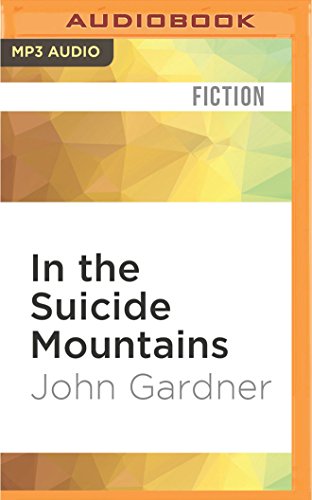
An intricately woven fable filled with magical creatures…and astonishing surprises.
In this wonderful fantasy, John Gardner weaves tales within tales to bring a magical world to vivid life. When three travelers on their way to the Suicide Mountains meet an enigmatic man, the Abbot of the Ancient Monastery, they begin a series of wild adventures in which they must confront mystical creatures…and come to terms with the roles fate has determined for each of them.
Superbly imagined and brimming with philosophical insight, In the Suicide Mountains is a tribute to Gardner’s passion for medieval storytelling, and an unforgettable novel in its own right.

A amalgam of fairy tales, nested within a fairy tail A amalgam of fairy tales, nested within a fairy tale, as Chaucer’s Canterbury Tales are nested within a fictional pilgrimage. In it, Gardner captures the quirky charm and picturesqueness of traditional fairy tales, al la the Brother Grimm. It is dismiss-able at first glance, as a mere imitative exercise, but takes on a kind of ironic poetic twist and allegorical panoply, as the main characters all seek their own demise via suicide, and encounter the murderous 6 fingered man, who, in his…
“Ah, that”–the happy medium between spelling out the moral of the story and letting readers interpret it for themselves During the course of this winsome and lively fantasy novella, the mysterious Abbot of the Ancient Monastery, unbidden, entertains his despondent guests with three adaptations of Russian tales. After the first story, Prince Christopher (who really doesn’t want to be a prince, much less the king) says, “It’s an interesting tale. Yet one thing I don’t understand, father.” “Yes?” responds the abbot.
One of America’s greatest authors One reviewer seemed upset that Gardner refered to himself as the greatest writer since Chaucer. Well, unlike Chaucer, Gardner tended to credit his sources, which lends itself to further support his work (Chaucer’s stories are mostly simply British retellings of Farid ud-Din Attar’s Conference of the Birds stories, from Persia). Will we be reading Gardner in 700 years? Maybe we will. While at Cornell, his work, Grendal, was required reading for a literature class. Chaucer wasn’t. Gardner is a…